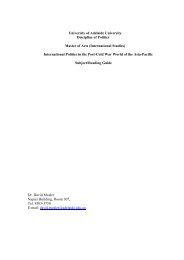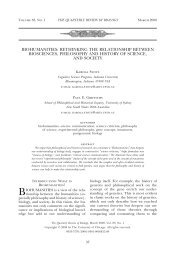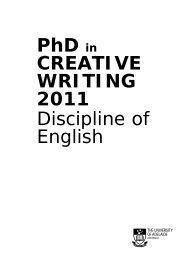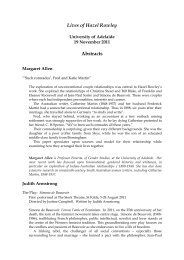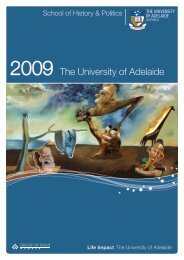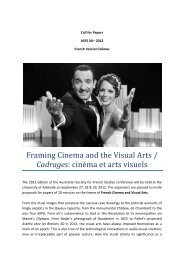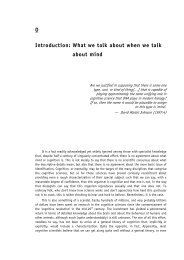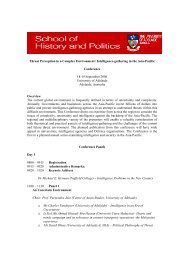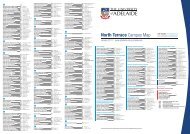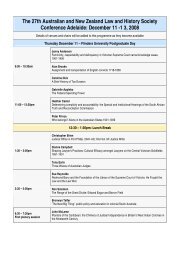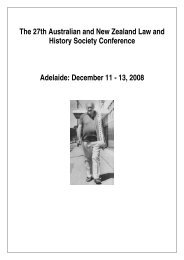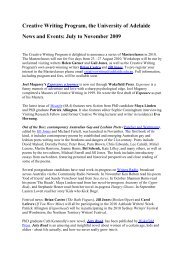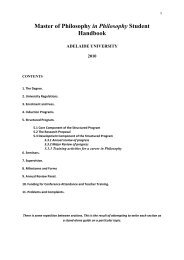German Studies - Faculty of Humanities & Social Sciences - The ...
German Studies - Faculty of Humanities & Social Sciences - The ...
German Studies - Faculty of Humanities & Social Sciences - The ...
Create successful ePaper yourself
Turn your PDF publications into a flip-book with our unique Google optimized e-Paper software.
THE UNIVERSITY OF ADELAIDE<br />
<strong>German</strong> <strong>Studies</strong><br />
Handbook 2012<br />
School <strong>of</strong> <strong>Humanities</strong>
CONTENTS<br />
STAFF / COURSE ADVISORS & COORDINATORS 3 – 4<br />
WHY GERMAN? 5<br />
GENERAL INFORMATION 6-10<br />
GERMAN UNDERGRADUATE COURSES<br />
<strong>German</strong> <strong>Studies</strong> I (Beginners) 11<br />
<strong>German</strong> <strong>Studies</strong> IS (Continuers) 13<br />
<strong>German</strong> <strong>Studies</strong> II (Beginners Level 2) 17<br />
<strong>German</strong> <strong>Studies</strong> IIS (Continuers Level 2) 20<br />
<strong>German</strong> <strong>Studies</strong> III (Beginners Level 3) 24<br />
<strong>German</strong> <strong>Studies</strong> IIIS (Continuers Level 3) 28<br />
<strong>German</strong> Special Topic II & III 32<br />
<strong>German</strong> Study Abroad 34<br />
<strong>German</strong> in <strong>German</strong>y 34<br />
HONOURS GERMAN STUDIES and<br />
Combined Honours with European <strong>Studies</strong> 35<br />
POSTGRADUATE STUDY 38<br />
SCHOLARSHIPS 39<br />
ASSESSMENT AND ESSAY WRITING 40<br />
A.U. GERMAN CLUB 43<br />
OCCUPATIONAL HEALTH & SAFETY 44<br />
ACADEMIC YEAR CALENDAR 45<br />
2
GERMAN STUDIES STAFF<br />
THE OFFICES OF GERMAN STUDIES STAFF ARE SITUATED<br />
ON THE 8TH LEVEL, NAPIER BUILDING.<br />
(Reception is located on the 7th floor <strong>of</strong> the Napier Building)<br />
Staff<br />
Margaret King, MA (Adelaide), Lecturer<br />
Napier Room 810, Ph. 8303 5639;<br />
Email: margaret.king@adelaide.edu.au<br />
Judith Wilson, BA Hons (Tasmania), DipEd (Adelaide), Lecturer<br />
Hughes Room 811, Ph. 8303 5642.<br />
Email: judith.wilson@adelaide.edu.au<br />
From July 2012:<br />
DAAD Lecturer<br />
DAAD Language Assistant<br />
Honorary Visiting Research Fellows<br />
Brian Coghlan, PhD (Birmingham), Emeritus Pr<strong>of</strong>essor<br />
Lee Kersten, BA Hons (Adelaide)<br />
Dr Engelhard Weigl, D.Phil. (Hamburg)<br />
Reception<br />
School <strong>of</strong> <strong>Humanities</strong> Office<br />
Room 722, 7th Floor Napier Building.<br />
Office hours are: Monday - Friday 9 am – 5 pm<br />
Telephone: 08 8303 4249<br />
Fax: 08 8303 5241<br />
3
COURSE ADVISORS and COORDINATORS 2012<br />
Head <strong>of</strong> Discipline<br />
Judith Wilson<br />
Discipline Course Advisor Margaret King (Semester 1)<br />
Judith Wilson (Semester 2)<br />
Course Coordinators<br />
Semester One<br />
<strong>German</strong> <strong>Studies</strong> ISA (Continuers)<br />
<strong>German</strong> <strong>Studies</strong> IA (Beginners)<br />
<strong>German</strong> <strong>Studies</strong> IIA: Lang & Soc<br />
<strong>German</strong> <strong>Studies</strong> IISA : Lang & Soc<br />
<strong>German</strong> IISA/IIIA: Cult <strong>Studies</strong><br />
<strong>German</strong> IIIA: Lang & Soc<br />
<strong>German</strong> IIISA: Lang & Soc<br />
<strong>German</strong> IIISA: Cult <strong>Studies</strong><br />
<strong>German</strong> Special Topic II & III<br />
Honours<br />
Postgraduates<br />
Judith Wilson<br />
Margaret King<br />
Margaret King<br />
Judith Wilson<br />
Margaret King<br />
Margaret King<br />
Judith Wilson<br />
Judith Wilson<br />
Margaret King<br />
Margaret King<br />
Margaret King<br />
Semester Two<br />
<strong>German</strong> <strong>Studies</strong> ISB (Continuers)<br />
<strong>German</strong> <strong>Studies</strong> IB (Beginners)<br />
<strong>German</strong> <strong>Studies</strong> IIB: Lang & Soc<br />
<strong>German</strong> IIB: Cult <strong>Studies</strong><br />
<strong>German</strong> <strong>Studies</strong> IISB : Lang & Soc<br />
<strong>German</strong> IISB/IIIB: Cult <strong>Studies</strong><br />
<strong>German</strong> IIIB: Lang & Soc<br />
<strong>German</strong> IIISB: Lang & Soc<br />
<strong>German</strong> IIISB: Cult <strong>Studies</strong><br />
<strong>German</strong> Special Topic II & III<br />
Honours<br />
Postgraduates<br />
Judith Wilson<br />
Judith Wilson<br />
Judith Wilson<br />
Judith Wilson<br />
DAAD Lecturer<br />
DAAD Lecturer<br />
Judith Wilson<br />
DAAD Lecturer<br />
DAAD Lecturer<br />
Judith Wilson<br />
DAAD Lecturer<br />
DAAD Lecturer<br />
4
Why <strong>German</strong>?<br />
<strong>German</strong> is good for your career<br />
<strong>German</strong>y is the world’s fourth largest economy<br />
<strong>German</strong>y is the largest economy in Europe<br />
<strong>German</strong>y is a world leader in manufacturing and design<br />
<strong>German</strong> companies & their subsidiaries in Australia provide around 90,000 Australians with<br />
jobs<br />
<strong>German</strong> provides you with access to a rich and diverse culture<br />
<strong>German</strong> music, literature and film<br />
<strong>German</strong> art and architecture<br />
<strong>German</strong> festivals and food<br />
<strong>German</strong> connects you with <strong>German</strong> speakers throughout Europe<br />
Most widely spoken mother tongue in Europe<br />
Official language <strong>of</strong> <strong>German</strong>y, Austria, Switzerland & Liechtenstein<br />
<strong>The</strong> <strong>German</strong> government provides generous scholarships for students <strong>of</strong> <strong>German</strong><br />
<strong>German</strong> Academic Exchange<br />
Goethe Institut<br />
Pedagogical Exchange Service<br />
You can study at a <strong>German</strong> university<br />
Through the university’s exchange programs with <strong>German</strong> universities<br />
Through the 6-week Stuttgart Winter University program<br />
<strong>German</strong> has a strong tradition in Australia<br />
<strong>German</strong> has a strong tradition that goes back to the beginnings <strong>of</strong> European settlement<br />
<strong>The</strong> <strong>German</strong>s were the largest non-British migrant group in the nineteenth century<br />
<strong>German</strong> is still one <strong>of</strong> the main foreign languages taught in the Australian education system<br />
5
GENERAL INFORMATION<br />
<strong>German</strong> <strong>Studies</strong> at the University <strong>of</strong> Adelaide is the only academic <strong>German</strong> <strong>Studies</strong> unit in South<br />
Australia and is a discipline in the School <strong>of</strong> <strong>Humanities</strong>. Students <strong>of</strong> Flinders University and the<br />
University <strong>of</strong> South Australia can take <strong>German</strong> <strong>Studies</strong> courses on a cross institutional basis. As a<br />
discipline it is independent, but has close links with other disciplines in the School <strong>of</strong> <strong>Humanities</strong>.<br />
<strong>German</strong> <strong>Studies</strong> <strong>of</strong>fers two main sequences <strong>of</strong> courses, running from first year through to third year:<br />
1. the beginners’ sequence (<strong>German</strong> I – <strong>German</strong> II – <strong>German</strong> III) for students who have little or no<br />
previous experience in learning <strong>German</strong>, or<br />
2. the continuers’ sequence (<strong>German</strong> IS – <strong>German</strong> IIS – <strong>German</strong> IIIS) for students who have completed<br />
Year 12 <strong>German</strong> or equivalent. Students not sure about which sequence to take should consult<br />
<strong>German</strong> <strong>Studies</strong> staff before enrolling. Other possible courses in <strong>German</strong> for the BA degree are<br />
<strong>German</strong> Special Topic II and III and <strong>German</strong> in <strong>German</strong>y.<br />
All courses in both streams aim to develop pr<strong>of</strong>iciency in the <strong>German</strong> language and to give students<br />
the opportunity to explore various aspects <strong>of</strong> <strong>German</strong> culture, past and present, with particular<br />
emphasis on the last 250 years, from the eighteenth century Enlightenment to the present. In first<br />
year, the study <strong>of</strong> language and culture is combined, but in second and third years, separate language<br />
and culture courses are <strong>of</strong>fered in order to allow more in-depth study.<br />
Students may study <strong>German</strong> within the normal requirements <strong>of</strong> the Bachelor <strong>of</strong> Arts or as part <strong>of</strong><br />
another degree program, such as the Bachelor <strong>of</strong> International <strong>Studies</strong>, the Bachelor <strong>of</strong> European<br />
<strong>Studies</strong> and the Bachelor <strong>of</strong> Languages. Students can study <strong>German</strong> as an elective for just one<br />
semester or one year, but in order to develop their language skills, most students will choose to<br />
complete a major (24 units) or a minor (18 units) in <strong>German</strong>. For maximum benefit, students should<br />
consider taking all <strong>of</strong> the language and culture courses on <strong>of</strong>fer, thereby completing an extended<br />
major (30 units). Students who choose to enrol in the Diploma in Languages will need to complete a<br />
major (24 units) in their chosen language. More information on compiling a minor or a major in<br />
<strong>German</strong> can be found below. Anyone wishing to study <strong>German</strong> as part <strong>of</strong> a Diploma in Languages or<br />
as part <strong>of</strong> a degree program other than the Bachelor <strong>of</strong> Arts should consult the HUMSS <strong>Faculty</strong> Office<br />
in order to plan their course choices before proceeding to second year.<br />
Note that all courses are semesterised, so students will receive a result at the end <strong>of</strong> each semester.<br />
As is the case with all language courses at university, the progression requirements for <strong>German</strong> are<br />
such that students must normally successfully complete one semester <strong>of</strong> language work before<br />
proceeding to the next semester course. From semester to semester and year to year, students build<br />
on their knowledge and skills as they become more confident in understanding, speaking and writing<br />
the language.<br />
Students who wish to pursue their interest in <strong>German</strong> beyond third year can do so by enrolling in<br />
Honours, provided they have a major in <strong>German</strong> with a Credit average. It is also possible to combine<br />
Honours in <strong>German</strong> with Honours in another discipline in the <strong>Faculty</strong>. After Honours, research<br />
degrees at both Masters and PhD levels can be undertaken in areas <strong>of</strong> <strong>German</strong> <strong>Studies</strong> that<br />
correspond to the research interests <strong>of</strong> staff.<br />
After First-Year<br />
In second year and third year (in both streams), there are separate language and culture courses in<br />
each semester, as follows (note that the "S" indicates the continuers' stream while "A" corresponds to<br />
first semester and "B" to second semester). <strong>The</strong> study <strong>of</strong> language and the study <strong>of</strong> culture are, <strong>of</strong><br />
course, interconnected. <strong>The</strong> study <strong>of</strong> language provides access to another culture; the study <strong>of</strong><br />
another culture will not only provide you with a knowledge and understanding <strong>of</strong> that culture but<br />
also improve your language skills (classes at second and third year level are mostly conducted in<br />
<strong>German</strong>), so to get most out <strong>of</strong> your <strong>German</strong> <strong>Studies</strong> we strongly recommend that you do both<br />
language and culture courses.<br />
6
Beginners' Stream<br />
Level II<br />
Continuers' Stream<br />
Level II<br />
Sem 1 <strong>German</strong> IIA: Language & Society <strong>German</strong> IISA: Language & Society<br />
<strong>German</strong> IIA: Cultural <strong>Studies</strong><br />
<strong>German</strong> IISA: Cultural <strong>Studies</strong><br />
Sem 2 <strong>German</strong> IIB: Language & Society <strong>German</strong> IISB: Language & Society<br />
<strong>German</strong> IIB: Cultural <strong>Studies</strong><br />
<strong>German</strong> IISB: Cultural <strong>Studies</strong><br />
Level III<br />
Level III<br />
Sem 1 <strong>German</strong> IIIA: Language & Society <strong>German</strong> IIISA: Language & Society<br />
<strong>German</strong> IIIA: Cultural <strong>Studies</strong> <strong>German</strong> IIISA: Cultural <strong>Studies</strong><br />
Sem 2 <strong>German</strong> IIIB: Language & Society <strong>German</strong> IIISB: Language & Society<br />
<strong>German</strong> IIIB: Cultural <strong>Studies</strong> <strong>German</strong> IIISB: Cultural <strong>Studies</strong><br />
All courses are <strong>of</strong> 3 units in value. <strong>The</strong> content <strong>of</strong> the culture courses will vary from year to year.<br />
Constructing a Major in <strong>German</strong><br />
As for all other disciplines or interdisciplinary areas within the <strong>Faculty</strong>, a major in <strong>German</strong> comprises<br />
24 units, or 8 x 3 unit courses. Unlike most other subject areas, however, there are specific<br />
progression requirements in <strong>German</strong>. Firstly, you normally need to pass each language course before<br />
moving on to the next semester <strong>of</strong> language study. Secondly, you need to pass a minimum <strong>of</strong> 9 units<br />
at second year (e.g. two language semesters plus one culture course or two culture courses and one<br />
language course) before enrolling in any <strong>of</strong> the third-year courses.<br />
<strong>The</strong> standard way <strong>of</strong> constructing a major in <strong>German</strong> is as follows:<br />
6 units in first year<br />
9 units in second year (2 language courses + 1 culture course or 1 language course + 2 culture<br />
courses)<br />
9 units in third year (2 language courses + 1 culture course or 1 language course + 2 culture courses)<br />
Extended Major<br />
To derive maximum benefit for your <strong>German</strong> skills, you can choose to complete an extended major <strong>of</strong><br />
30 units by taking all 10 courses, as follows:<br />
6 units in first year<br />
12 units in second year (2 language courses + 2 culture courses)<br />
12 units in third year (2 language courses + 2 culture courses)<br />
This is particularly important for anyone considering enrolling in Honours <strong>German</strong> in their fourth<br />
year.<br />
7
Diploma in Languages<br />
Any student who has accepted or who holds a place in an undergraduate Bachelor degree at the<br />
University <strong>of</strong> Adelaide, and who has obtained the consent <strong>of</strong> their relevant faculty to study the two<br />
awards concurrently, can apply for admission to the Diploma in Languages.<br />
<strong>The</strong> course is not available to students from universities other than Adelaide. Languages currently<br />
available to University <strong>of</strong> Adelaide students through the Language Outreach program are included in<br />
the Diploma <strong>of</strong> languages. If you are a Flinders student you can do <strong>German</strong> in a Flinders Diploma <strong>of</strong><br />
Languages.<br />
You cannot do the Diploma <strong>of</strong> Languages by itself. You can only do it if you are enrolled concurrently<br />
with full - or part-time study in another undergraduate degree. You can begin the Diploma in<br />
Languages at any point in your undergraduate degree, but you must remember that the Diploma in<br />
Languages requires a three-year sequence <strong>of</strong> <strong>German</strong>.<br />
If you are enrolled in the Diploma in Languages, you need to complete a major in your chosen<br />
language (ie 24 units). If you choose to do <strong>German</strong> for your Diploma, simply follow the instructions for<br />
completing a major in <strong>German</strong>. In order to accommodate these additional language courses, students<br />
will add one year to their undergraduate degree program.<br />
For further information refer to the <strong>Faculty</strong>'s Graduate Coursework Degrees leaflet or visit the <strong>Faculty</strong><br />
website at:<br />
http://arts.adelaide.edu.au/arts-web/<br />
Alternatively contact the <strong>Faculty</strong> Office.<br />
<strong>The</strong> major for students who commenced <strong>German</strong> before 2008<br />
Students who commenced <strong>German</strong> before 2008 and who completed second-year <strong>German</strong> under the<br />
previous curriculum structure will have passed 14 units, as follows:<br />
First year: 6 units<br />
Second year: 8 units<br />
This leaves a total <strong>of</strong> 10 units to complete in order to fulfil the current requirements for a major (or<br />
for a Diploma in Languages). As all courses are now <strong>of</strong> 3 units in value, the <strong>Faculty</strong> has determined<br />
that students in this situation will qualify for a major (or Diploma) if the number <strong>of</strong> units they<br />
complete falls 1 or 2 units above or below the 24 units required for the new major. This means you<br />
have two options:<br />
Either<br />
Complete 4 courses at third year (2 language + 2 culture courses)<br />
Total units: 14 + 12 (4 x 3) = 26 units<br />
or<br />
Complete 3 courses at third year (2 language + 1 culture or 1 language + 2 culture courses)<br />
Total units: 14 + 9 (3 x 3) = 23 units<br />
Note that when you commenced (i.e. before the introduction <strong>of</strong> the new curriculum), the major (and<br />
Diploma) in <strong>German</strong> corresponded to 26 units, which is one <strong>of</strong> the options indicated above.<br />
8
Constructing a Minor in <strong>German</strong><br />
As for all other disciplines or interdisciplinary areas within the <strong>Faculty</strong>, a minor in <strong>German</strong> comprises<br />
18 units, or 6 x 3 unit courses. Unlike most other subject areas, however, there are progression<br />
requirements in <strong>German</strong>. You normally need to pass each language course before moving on to the<br />
next semester <strong>of</strong> language study.<br />
This means you have two ways <strong>of</strong> constructing a minor in <strong>German</strong>:<br />
Either<br />
6 units in first year<br />
12 units in second year (2 language courses + 2 culture courses)<br />
or<br />
6 units in first year<br />
6 units in second year (2 language courses or 2 culture courses or 1 language course and 1 culture<br />
course)<br />
6 units in third year (2 language courses or 2 culture courses or I language course and 1 culture<br />
course)<br />
9
Aims <strong>of</strong> Our Courses<br />
Generic Skills<br />
All <strong>German</strong> courses focus on providing students with the necessary generic skills, that is, their primary<br />
aim is to:<br />
1) develop students’ pr<strong>of</strong>iciency in the written and spoken language and<br />
2) give students the opportunity to explore various aspects <strong>of</strong> <strong>German</strong> culture and society, past and<br />
present.<br />
This means that as each semester progresses, students will be assisted to:<br />
• increase their vocabulary in a range <strong>of</strong> different subject areas<br />
• gain pr<strong>of</strong>iciency in reading and writing <strong>German</strong><br />
• develop an understanding <strong>of</strong> grammatical structures and their accurate use<br />
• develop an increasing level <strong>of</strong> communicative pr<strong>of</strong>iciency in spoken <strong>German</strong><br />
• develop an understanding <strong>of</strong> the interconnecting relations <strong>of</strong> language and culture<br />
• increase their knowledge <strong>of</strong> <strong>German</strong> society and culture<br />
• gain knowledge <strong>of</strong> various aspects <strong>of</strong> <strong>German</strong> cultural and social history.<br />
Graduate Attributes<br />
<strong>The</strong> <strong>German</strong> <strong>Studies</strong> discipline encourages you to develop the following skills and attributes:<br />
• a knowledge and understanding <strong>of</strong> the <strong>German</strong> language and many different aspects <strong>of</strong> <strong>German</strong> culture<br />
and society<br />
• the ability to work independently to use a variety <strong>of</strong> sources to further your own understanding <strong>of</strong> the<br />
<strong>German</strong> language and culture<br />
• the ability to work to strict timelines, as all <strong>German</strong> courses are designed around regular assessment<br />
exercises<br />
• the ability to research, synthesise, analyse and present information using a wide range <strong>of</strong> appropriate<br />
technologies and resources<br />
• increased critical and analytical thinking skills<br />
• the ability to work collaboratively with your peers and to communicate effectively with them, <strong>of</strong>ten in<br />
<strong>German</strong><br />
• the potential to learn other languages more easily in the future<br />
• an understanding <strong>of</strong> and respect for global and local cultural differences and diversity, combined with a<br />
knowledge and understanding <strong>of</strong> issues involved in intercultural communication<br />
• a heightened awareness and understanding <strong>of</strong> different ways <strong>of</strong> seeing the world, including specifically<br />
<strong>German</strong> and European world views<br />
• an understanding <strong>of</strong> and commitment to the importance <strong>of</strong> life-long learning through a passion for<br />
<strong>German</strong> language and culture that will, we hope, encourage you to travel, study or work in a <strong>German</strong>speaking<br />
environment in the future.<br />
10
GERMAN I A: Beginners’ <strong>German</strong><br />
(GERM 1002)<br />
Level:<br />
One<br />
Course Coordinator:<br />
Margaret King<br />
Points Value: 3<br />
Quota:<br />
None<br />
Duration:<br />
Semester One<br />
Prerequisites:<br />
None<br />
Restrictions:<br />
Assumed Knowledge:<br />
Contact hours (per week):<br />
Times:<br />
<strong>German</strong> <strong>Studies</strong> IS; except with the permission <strong>of</strong> <strong>German</strong><br />
<strong>Studies</strong>, SACE stage 2 <strong>German</strong><br />
None<br />
4 hours <strong>of</strong> language workshops<br />
Wed. 9.10-11 am & Thurs. 9.10-11 am<br />
or Tues. 4.10-6pm & Wed. 4.10-6pm.<br />
No previous knowledge <strong>of</strong> <strong>German</strong> is assumed. All classes contain a balanced combination <strong>of</strong><br />
comprehension, speaking, grammar, reading and writing. It is expected that each student will spend<br />
at least eight hours <strong>of</strong> private study each week working with the course materials, reviewing work<br />
done in class and preparing lessons. Aspects <strong>of</strong> <strong>German</strong> culture will be a component <strong>of</strong> language<br />
instruction throughout the year. Successful completion <strong>of</strong> this course with a Pass (50% and above)<br />
admits students to <strong>German</strong> I B Beginners <strong>German</strong> (1003).<br />
Prescribed text:<br />
T. Terrell, B. Nikolai, E. Tschirner:, Kontakte 6 th edition (McGraw-Hill) (available in a shrinkwrap which<br />
contains a course book and a workbook).<br />
N.B.<br />
Students intending to proceed to higher years are strongly advised to buy Collins <strong>German</strong><br />
Dictionary. (Collins, latest edition )<br />
ASSESSMENT<br />
Assessment is continuous, with homeworks, vocab tests, a class test during the semester and a final<br />
test at the end. Students' oral participation will also be assessed by an oral examination at the end <strong>of</strong><br />
the semester. Further details will be provided in the Course Outline handed out at the beginning <strong>of</strong> the<br />
semester. Please make sure you get one and read it carefully. It will also be available on MyUni.<br />
11
GERMAN I B Beginners’ <strong>German</strong><br />
(GERM 1003)<br />
Level:<br />
One<br />
Course Coordinator:<br />
Judith Wilson<br />
Points Value: 3<br />
Quota:<br />
None<br />
Duration:<br />
Semester Two<br />
Prerequisites:<br />
Restrictions:<br />
Contact hours (per week):<br />
Times:<br />
<strong>German</strong> I A Beginners <strong>German</strong> (GERM 1002) or the<br />
permission <strong>of</strong> the course coordinator<br />
<strong>German</strong> <strong>Studies</strong> IS; except with the permission <strong>of</strong> <strong>German</strong><br />
<strong>Studies</strong>, SACE stage 2 <strong>German</strong><br />
4 hours <strong>of</strong> language workshops<br />
Mon. 12.10-2 pm & Tues. 10.10 am-12 pm.<br />
or Tues. 4.10-6pm. & Thurs. 4.10-6pm.<br />
This second semester course is the sequel to <strong>German</strong> I A Beginners’ <strong>German</strong>. It is expected that each<br />
student will spend at least eight hours <strong>of</strong> private study each week working with the course materials,<br />
reviewing work done in class and preparing lessons. Aspects <strong>of</strong> <strong>German</strong> culture and literature will be a<br />
component <strong>of</strong> language instruction throughout the semester. Successful completion <strong>of</strong> this course<br />
with a Pass (50% or more) normally admits students to <strong>German</strong> <strong>Studies</strong> II A.<br />
Prescribed text:<br />
T. Terrell, B. Nikolai, E. Tschirner:, Kontakte 6 th edition (McGraw-Hill) (available in a shrinkwrap which<br />
contains a course book and a workbook).<br />
N.B. Students intending to proceed to higher years are strongly advised to buy Collins <strong>German</strong><br />
Dictionary. (Collins, latest edition )<br />
ASSESSMENT<br />
Assessment is continuous, with homeworks, vocab tests, a class test during the semester and a final<br />
test at the end. Students' oral participation will also be assessed by an oral examination at the end <strong>of</strong><br />
the semester. Further details are provided in the Course Outline. If you are joining the course in<br />
second semester, please make sure you obtain a Course Outline and read it carefully. It will also be<br />
available on MyUni.<br />
12
GERMAN STUDIES IS A (GERM 1011)<br />
Level:<br />
Course Coordinator:<br />
Points Value: 3<br />
Quota:<br />
Duration:<br />
Prerequisites:<br />
One<br />
Judith Wilson<br />
None<br />
Semester One<br />
New SACE Stage 2 Continuers’ <strong>German</strong> with a scaled score<br />
<strong>of</strong> B- or higher, or equivalent<br />
Restrictions:<br />
<strong>German</strong> <strong>Studies</strong> IA<br />
Assumed Knowledge:<br />
See prerequites<br />
Contact hours (per week): Language workshops 1x2hrs.<br />
Tutorial -<br />
1x1hr.<br />
Culture lecture<br />
1x1hr.<br />
<strong>The</strong> aim <strong>of</strong> <strong>German</strong> <strong>Studies</strong> ISA is to make students more skilled at speaking and writing the <strong>German</strong><br />
language and more informed about contemporary <strong>German</strong> culture. Through lectures and tutorials<br />
and using books, films and videos, students will be given practice in speaking and writing the language<br />
and become more informed about the cultural, social and political history <strong>of</strong> <strong>German</strong>y from 1945 up<br />
to the present.<br />
It is assumed that students will normally have studied <strong>German</strong> to year 12 level, but other students<br />
may take the course where appropriate. Students with outstanding qualifications in language may,<br />
with the permission <strong>of</strong> <strong>German</strong> <strong>Studies</strong>, take the language component <strong>of</strong> the course at a more<br />
advanced level. NB. <strong>The</strong>se students will, however, still be enrolled in <strong>German</strong> ISA. <strong>The</strong>re will be a<br />
placement test in Orientation Week to decide this.<br />
In the first semester all students will have a weekly lecture on the topic: Milestones in <strong>German</strong><br />
History: 1945 to the present. <strong>The</strong> other three weekly contact hours are devoted to practical language<br />
instruction, 2 hours in a language workshop and one in a small conversation tutorial group.<br />
ASSESSMENT<br />
1. Language: Homeworks, class tests, end-<strong>of</strong>-semester tests, tutorial participation,,<br />
vocab tests and an oral examination or an oral presentation.<br />
2. Culture: An essay and a minor assignment(s). See the Course Outline for details.<br />
Students are expected to achieve a reasonable balance in all areas <strong>of</strong> the<br />
course.<br />
13
Lecture and Tutorial Schedule<br />
1. Language workshops<br />
All students will attend a two-hour language workshop per week throughout the semester, either<br />
Tues. 10.10-12 or Thursday 11.10-1. <strong>The</strong> language workshop is designed to extend students'<br />
command <strong>of</strong> written <strong>German</strong>. Students will also receive instruction in basic <strong>German</strong> grammar and its<br />
application.<br />
2. Tutorial<br />
<strong>The</strong>re is a weekly tutorial in small groups to encourage students to practise speaking <strong>German</strong> and to<br />
increase their active command <strong>of</strong> the language. An assessment <strong>of</strong> each student's oral participation<br />
will count towards the final result, and there will be an oral examination or oral presentation at the<br />
end <strong>of</strong> the semester. <strong>The</strong> tutorials are on Thursday 3.10-4 or Thursday 4.10-5, or Friday 12.10-1.<br />
NB. Tutorials will begin in the second week <strong>of</strong> the semester.<br />
Prescribed texts:<br />
Moeller, J et al. Kaleidoskop 8th edition, Student Activities Manual, Premium Website Printed Access<br />
Card, 2012 (Cengage)<br />
NB. Students intending to proceed to higher years are strongly advised to buy Collins <strong>German</strong><br />
Dictionary (latest edition).<br />
Important! Please note!<br />
Students doing the language part <strong>of</strong> the course at another level should check which language class<br />
they will be attending before they buy the books!<br />
3. Milestones in <strong>German</strong> History: 1945 to the Present Wednesday 10.10 - 11<br />
NB. All <strong>German</strong> <strong>Studies</strong> ISA take this course.<br />
For <strong>German</strong>s in the East and the West, the path into the 21st century has been full <strong>of</strong> turning-points<br />
and events which have shaped the generations – from <strong>German</strong>y’s Stunde Null in 1945 to the erection<br />
<strong>of</strong> the Berlin Wall in 1961 to the fall <strong>of</strong> the Wall in 1989 and <strong>German</strong> reunification in 1990, to mention<br />
just some <strong>of</strong> the most significant. This course provides an overview <strong>of</strong> essential facts about politics,<br />
society and culture from 1945 to the present.<br />
Prescribed texts:<br />
<strong>The</strong>re will be a reader for this course which can be purchased from Image and Copy at the beginning<br />
<strong>of</strong> the semester.<br />
14
GERMAN STUDIES IS B (GERM 1012)<br />
Level:<br />
Course Coordinator:<br />
Points Value: 3<br />
Quota:<br />
Duration:<br />
Prerequisites:<br />
Restrictions:<br />
Contact hours (per week):<br />
One<br />
Judith Wilson<br />
None<br />
Semester Two<br />
<strong>German</strong> <strong>Studies</strong> ISA (Pass or higher)<br />
or its equivalent<br />
<strong>German</strong> <strong>Studies</strong> IA or IB<br />
Language workshops - 1x2hrs.<br />
Tutorials – 1x1hr.<br />
Culture lecture – 1x1hr.<br />
<strong>The</strong> aim <strong>of</strong> <strong>German</strong> <strong>Studies</strong> IS B is to extend students’ knowledge about the life and language <strong>of</strong><br />
contemporary <strong>German</strong>-speaking countries. Through lectures and tutorials and using books, films and<br />
videos, students will be given practice at speaking and writing the language and will learn more about<br />
different aspects <strong>of</strong> contemporary <strong>German</strong> culture.<br />
It is assumed that students will normally have completed <strong>German</strong> <strong>Studies</strong> IS A (Pass or higher), but<br />
other students may take the course where appropriate. Students with outstanding qualifications in<br />
language may, with the permission <strong>of</strong> <strong>German</strong> <strong>Studies</strong>, take the language component <strong>of</strong> the course at<br />
a more advanced level.<br />
In second semester all students will have a weekly lecture on the topic: Understanding Contemporary<br />
<strong>German</strong>y.<br />
<strong>The</strong> other three weekly contact hours are devoted to practical language instruction, 2 hours in<br />
language workshops and one in a small tutorial group.<br />
ASSESSMENT<br />
1. Language: Homeworks, class tests, end-<strong>of</strong>-semester tests, tutorial participation,<br />
tutorial compositions, vocab tests and an oral.<br />
2. Culture: An essay and a minor assignment(s), two tests. See the Course Outline for<br />
details.<br />
Students are expected to achieve a reasonable balance in all areas <strong>of</strong> the course.<br />
15
Lecture and Tutorial Schedule<br />
1. Language workshops<br />
All students will attend one two-hour language workshop per week throughout the semester on<br />
Monday 2.10-4. Language workshops are designed to extend students' command <strong>of</strong> written <strong>German</strong>.<br />
Students will receive instruction in basic <strong>German</strong> grammar and its application. <strong>The</strong>re will be regular<br />
homeworks, two class tests and an end-<strong>of</strong>-semester test. <strong>The</strong>se will all contribute to the student's<br />
final mark at the end <strong>of</strong> the year.<br />
2. Tutorial<br />
<strong>The</strong>re is a weekly tutorial in small groups to encourage students to practise speaking <strong>German</strong> and to<br />
increase their active command <strong>of</strong> the language. An assessment <strong>of</strong> each student's oral participation<br />
will count towards the final result, and there will be an oral at the end <strong>of</strong> the semester. <strong>The</strong> tutorials<br />
are on Wed. 10.10-11, or Thurs. 9.10-10.<br />
Tutorials will begin in the second week <strong>of</strong> the semester.<br />
Prescribed texts:<br />
Moeller, J et al. Kaleidoskop 8th edition, Student Activities Manual, Premium Website Printed Access<br />
Card, 2012 (Cengage)<br />
NB. Students intending to proceed to higher years are strongly advised to buy Collins <strong>German</strong><br />
Dictionary (latest edition).<br />
Important! Please note!<br />
Students doing the language part <strong>of</strong> the course at another level should check which language class<br />
they will be attending before they buy the books!<br />
3. Understanding Contemporary <strong>German</strong>y<br />
Wednesday 1.10 - 2<br />
NB. All <strong>German</strong> ISB and IIB Cultural <strong>Studies</strong> students take this lecture.<br />
This lecture course is designed to contribute to students’ understanding <strong>of</strong> contemporary <strong>German</strong>y. It<br />
does not aim to be comprehensive, but will focus on aspects <strong>of</strong> the culture and society that are<br />
distinctively <strong>German</strong> and on related issues. It will begin with the question <strong>of</strong> <strong>German</strong>y identity and<br />
cover a range <strong>of</strong> different topics such as <strong>German</strong>y’s regions, <strong>German</strong> citizenship and the challenges <strong>of</strong><br />
migration and multi-ethnicity, changes in the <strong>German</strong> language and what they reflect, stereotypical<br />
perceptions <strong>of</strong> <strong>German</strong>y and the <strong>German</strong>s and the reasons for their persistence.<br />
Information will be provided mainly in English but lectures will include film and print material in<br />
<strong>German</strong> and guest speakers will speak in <strong>German</strong> so students are gradually exposed to more complex<br />
issues in <strong>German</strong> and are thus given the opportunity to expand their vocabulary and improve their<br />
listening and comprehension skills.<br />
Prescribed reading:<br />
<strong>The</strong>re will be a reader for this course that can be purchased from Image & Copy at the beginning <strong>of</strong><br />
the semester.<br />
16
GERMAN STUDIES II A: GERMAN LANGUAGE & SOCIETY<br />
(GERM 2203)<br />
Level:<br />
Course Coordinator:<br />
Points Value: 3<br />
Quota:<br />
Duration:<br />
Prerequisites:<br />
Restrictions:<br />
Assumed Knowledge:<br />
Contact hours (per week):<br />
Two<br />
Margaret King<br />
None<br />
Semester One<br />
A Pass in <strong>German</strong> I B (GERM 1003) or its equivalent<br />
<strong>German</strong> <strong>Studies</strong> IIS; no part <strong>of</strong> this course may be counted<br />
toward other courses in <strong>German</strong> <strong>Studies</strong><br />
See prerequisites<br />
Language workshop – 1x2hrs.<br />
Tutorial –1<br />
<strong>German</strong> <strong>Studies</strong> II is the level two course for the Beginners’ stream. Building on the language sections<br />
<strong>of</strong> <strong>German</strong> IA and IB, this course aims to further develop students' pr<strong>of</strong>iciency in the four language<br />
skills - listening, speaking, reading and writing - through a combination <strong>of</strong> readings and reproductive<br />
and creative exercises. It also aims to enhance students' intercultural understanding through the use<br />
<strong>of</strong> authentic texts that focus on aspects <strong>of</strong> contemporary society in <strong>German</strong>-speaking countries and<br />
promote comparison and discussion.<br />
Lecture and Tutorial Schedule -<br />
Language workshop<br />
All students will attend a three-hour language workshop per week throughout the semester, Thursday<br />
11.10- 12 and Friday 1.10 - 3. <strong>The</strong> language workshop is designed to extend students’ command <strong>of</strong> the<br />
four basic language skills: listening, speaking, reading and writing. Students will also develop the<br />
appropriate background knowledge <strong>of</strong> cultural contexts necessary for cultural competence in<br />
communication. <strong>The</strong> course organization, content and assessment are all designed to provide a solid<br />
grounding in all these areas.<br />
Prescribed text:<br />
T. Terrell, B. Nikolai, E. Tschirner:, Kontakte 6 th edition (McGraw-Hill) (available in a shrinkwrap which<br />
contains a course book and a workbook).<br />
NB. Students intending to proceed to higher years are strongly advised to buy Collins <strong>German</strong><br />
Dictionary (latest edition).<br />
ASSESSMENT<br />
Assessment is continuous, with regular homeworks and vocabulary test, a class test during the<br />
semester and a final test at the end. Students' oral participation will also be assessed by an oral<br />
examination at the end <strong>of</strong> the semester. Further details will be provided in the Course Outline handed<br />
out at the beginning <strong>of</strong> the semester. Please make sure you get one and read it carefully. It will also be<br />
available on MyUni.<br />
Students are expected to achieve a reasonable balance in all areas <strong>of</strong> the course.<br />
\<br />
17
GERMAN STUDIES II B: LANGUAGE & SOCIETY (GERM<br />
2204)<br />
Level:<br />
Course Coordinator:<br />
Points Value: 3<br />
Quota:<br />
Duration:<br />
Two<br />
Judith Wilson<br />
None<br />
Semester Two<br />
Prerequisites: Normally a Pass in <strong>German</strong> <strong>Studies</strong> IIA, (GERM 2203)<br />
or its equivalent<br />
Restrictions:<br />
Contact hours (per week):<br />
<strong>German</strong> <strong>Studies</strong> IIS; no part <strong>of</strong> this course may be counted<br />
toward other courses in <strong>German</strong> <strong>Studies</strong><br />
Language Workshop – 1x2hrs.<br />
Tutorial -1x1hr.<br />
Building on <strong>German</strong> IIA, this course aims to further develop students' pr<strong>of</strong>iciency in the four language<br />
skills - listening, speaking, reading and writing - through a combination <strong>of</strong> readings and reproductive<br />
and creative exercises. It also aims to enhance students' intercultural understanding through the use<br />
<strong>of</strong> authentic texts that focus on aspects <strong>of</strong> contemporary society in <strong>German</strong>-speaking countries and<br />
promote comparison and discussion.<br />
Lecture and Tutorial Schedule<br />
1. Language classes<br />
All students will attend a two-hour language workshop each week throughout the semester, Friday<br />
11.10-1. <strong>The</strong> language workshop is designed to extend students’ command <strong>of</strong> the four basic language<br />
skills: listening, speaking, reading and writing. Students will also develop the appropriate background<br />
knowledge <strong>of</strong> cultural contexts necessary for cultural competence in communication. <strong>The</strong> course<br />
organization, content and assessment are all designed to provide a solid grounding in all these areas.<br />
2. Tutorials<br />
Tutorials are given each week in small groups to encourage students to practise speaking <strong>German</strong> and<br />
to increase their active command <strong>of</strong> the language. An assessment <strong>of</strong> each student’s oral participation<br />
and other tutorial work will count towards the final result. <strong>The</strong> tutorials are on Friday 2.10-3 and<br />
Friday 3.10-4.<br />
Prescribed texts:<br />
Hilpert, Silke et.al. Schritte International 5 (Hueber)<br />
Gottstein-Schramm, Barbara, Schritte Übungsgrammatik (Hueber)<br />
ASSESSMENT<br />
Assessment is continuous, with regular homeworks and vocabulary tests, a class test during the<br />
semester and a final test at the end. Students' oral participation will also be assessed by an oral<br />
examination at the end <strong>of</strong> the semester. Further details will be provided in the Course Outline handed<br />
out at the beginning <strong>of</strong> the semester. Please make sure you get one and read it carefully. It will also be<br />
available on MyUni.<br />
Students are expected to achieve a reasonable balance in all areas <strong>of</strong> the course.<br />
18
GERMAN IIB: CULTURAL STUDIES (2224)<br />
Level:<br />
Course Coordinator:<br />
Points Value: 3<br />
Quota:<br />
Duration:<br />
Prerequisites:<br />
Restrictions:<br />
Assumed Knowledge:<br />
Contact hours (per week):<br />
Two<br />
Judith Wilson<br />
None<br />
Semester One<br />
A Pass in <strong>German</strong> I B (GERM 1003) or its equivalent<br />
<strong>German</strong> <strong>Studies</strong> IIS; no part <strong>of</strong> this course may be counted<br />
toward other courses in <strong>German</strong> <strong>Studies</strong><br />
See prerequisites<br />
Lecture – 1x1hr.<br />
Seminar –1x2hrs.<br />
This course is designed to extend students' understanding <strong>of</strong> contemporary <strong>German</strong>y. Information<br />
will be provided mainly in English but lectures will include film and print material in <strong>German</strong> and guest<br />
speakers will speak in <strong>German</strong> so students are gradually exposed to more complex issues in <strong>German</strong><br />
and are thus given the opportunity to improve their listening and comprehension skills. Students<br />
attend one lecture with <strong>German</strong> ISB students, but have in addition a two-hour seminar which will<br />
expand on some <strong>of</strong> the topics treated in the lecture.This seminar will provide students with the<br />
opportunity to study topics in more depth through the discussion <strong>of</strong> various texts associated with<br />
issues presented in the lectures.<br />
Lecture and Seminar Schedule<br />
Lecture: Understanding Contemporary <strong>German</strong>y: Wednesday 1.10 - 2<br />
Seminar: Thursday 2.10-4<br />
ASSESSMENT<br />
An essay, an oral presentation and a minor assignment(s). Marks will also be given for participation<br />
and preparation and homework. See the Course Outline for details.<br />
Students are expected to achieve a reasonable balance in all areas <strong>of</strong> the course.<br />
Prescribed texts:<br />
<strong>The</strong>re will be a reader for this course which can be purchased from Image and Copy at the beginning<br />
<strong>of</strong> the semester.<br />
19
GERMAN STUDIES IIS A: LANGUAGE & SOCIETY (GERM<br />
2211)<br />
Level:<br />
Course Coordinator:<br />
Points Value: 3<br />
Quota:<br />
Duration:<br />
Prerequisites:<br />
Two<br />
Judith Wilson<br />
None<br />
Semester One<br />
A Pass (i.e. 50% and above) in <strong>German</strong> <strong>Studies</strong> IS B (GERM<br />
1012) or its equivalent.<br />
Restrictions:<br />
Assumed Knowledge:<br />
Contact hours (per week):<br />
<strong>German</strong> <strong>Studies</strong> II; no part <strong>of</strong> this course may be counted<br />
toward other courses in <strong>German</strong> <strong>Studies</strong><br />
See prerequisites<br />
Language workshop – 1x2hrs.<br />
Tutorial – 1x1hr.<br />
Building on the language sections <strong>of</strong> <strong>German</strong> ISA and ISB, this course aims to further develop<br />
students' pr<strong>of</strong>iciency in the four language skills - listening, speaking, reading and writing - through a<br />
combination <strong>of</strong> readings and reproductive and creative exercises. It also aims to enhance students'<br />
intercultural understanding through the use <strong>of</strong> authentic texts that focus on aspects <strong>of</strong> contemporary<br />
society in <strong>German</strong>-speaking countries and promote comparison and discussion.<br />
Language instruction consists <strong>of</strong> one two-hour language workshop per week Wednesday 2.10-4 and<br />
one weekly tutorial in small groups. Tutorial times are Tuesday 9.10-11 or Thursday 12.10-1<br />
Prescribed Texts:<br />
Koithan, Ute et al, Aspekte. Mittelstufe Deutsch 2 (B2) (Langenscheidt)<br />
You need to have 1) Lehrbuch 2) Arbeitsbuch<br />
NB. Students intending to proceed to higher years are strongly advised to buy Collins <strong>German</strong><br />
Dictionary (latest edition).<br />
Important! Please note!<br />
Students doing the language part <strong>of</strong> the course at another level should check which language class<br />
they will be attending before they buy the books!<br />
ASSESSMENT<br />
Homework, class tests, end-<strong>of</strong>-semester test, tutorial participation, vocab tests and an oral<br />
examination or an oral presentation. See Course Outline for details.<br />
20
GERMAN IISA: CULTURAL STUDIES (2221)<br />
Level:<br />
Course Coordinator:<br />
Points Value: 3<br />
Quota:<br />
Duration:<br />
Prerequisites:<br />
Restrictions:<br />
Assumed Knowledge:<br />
Contact hours (per week):<br />
Lecture and Seminar Schedule<br />
Lecture:<br />
Mon. 11.10 - 12<br />
Seminar: Tues. 12.10-2<br />
Two<br />
Margaret King<br />
None<br />
Semester One<br />
GERM 1012 or equivalent<br />
No part <strong>of</strong> this course may be counted toward other<br />
courses in <strong>German</strong> <strong>Studies</strong><br />
See prerequisites<br />
Lecture – 1x1hr.<br />
Seminar –1x2hrs.<br />
A <strong>German</strong> Childhood: <strong>The</strong> overall aim <strong>of</strong> this course is to develop students' understanding <strong>of</strong> <strong>German</strong><br />
culture through the study <strong>of</strong> texts, written and visual, in the framework <strong>of</strong> their social and historical<br />
context. Students will not only develop their cultural understanding, but also their reading and<br />
analytical skills and their language pr<strong>of</strong>iciency.<br />
<strong>The</strong> specific focus <strong>of</strong> the course is growing up in Nazi <strong>German</strong>y and Austria. How do children behave in<br />
extreme circumstances like these? For those who survived, is it ever possible to escape from the<br />
identity <strong>of</strong> either victim or perpetrator/bystander? In this course we will examine texts and films in<br />
which <strong>German</strong>s and Austrians, both Jewish and non-Jewish, attempt to make sense <strong>of</strong> their childhood<br />
and come to terms with this most difficult period in <strong>German</strong> history. Topics to be discussed include<br />
schooling, the importance <strong>of</strong> Nazi youth groups, the influence <strong>of</strong> mothers, fathers and peer groups<br />
and the role <strong>of</strong> memory in structuring our perceptions <strong>of</strong> ourselves and our pasts.<br />
Prescribed texts:<br />
Nöstlinger, Christine: Maikäfer Flieg! Beltz & Gelberg<br />
<strong>The</strong>re will also be a reader for this course which can be purchased from Image and Copy at the<br />
beginning <strong>of</strong> the semester.<br />
ASSESSMENT<br />
An oral presentation, a written presentation, a book journal and a research essay. See the Course<br />
Outline for details.<br />
22
GERMAN IISB: CULTURAL STUDIES (2222)<br />
Level:<br />
Course Coordinator:<br />
Points Value: 3<br />
Quota:<br />
Duration:<br />
Prerequisites:<br />
Restrictions:<br />
Assumed Knowledge:<br />
Contact hours (per week):<br />
Lecture and Seminar Schedule<br />
Lecture:<br />
Tues. 9.10 - 10<br />
Seminar: Frid. 9.10-11<br />
Two<br />
DAAD Lecturer<br />
None<br />
Semester One<br />
A Pass in <strong>German</strong> I B (GERM 1003) or its equivalent<br />
<strong>German</strong> <strong>Studies</strong> IIS; no part <strong>of</strong> this course may be counted<br />
toward other courses in <strong>German</strong> <strong>Studies</strong><br />
See prerequisites<br />
Lecture – 1x1hr.<br />
Seminar –1x2hrs.<br />
In Semester 2 it is anticipated that <strong>German</strong> <strong>Studies</strong> will have a new staff member, a DAAD lecturer,<br />
who will be taking this course. For that reason we cannot provide any details about the content <strong>of</strong> the<br />
course at this stage. Information will be provided as soon as it is available.<br />
Prescribed texts:<br />
ASSESSMENT<br />
.<br />
23
GERMAN STUDIES III A: LANGUAGE & SOCIETY (GERM<br />
3203)<br />
Level:<br />
Course Coordinator:<br />
Points Value: 3<br />
Quota:<br />
Duration:<br />
Prerequisites:<br />
Restrictions:<br />
Contact Hours (per week)<br />
Three<br />
Margaret King<br />
None<br />
Semester One<br />
A Pass in <strong>German</strong> <strong>Studies</strong> II B (2204) or its equivalent<br />
No part <strong>of</strong> this course may be counted towards other<br />
courses in <strong>German</strong> <strong>Studies</strong><br />
Language workshop – 1x2hrs.<br />
Tutorial – 1x1hr.<br />
<strong>German</strong> IIIA is the follow-on course from the level 2 beginners’ language course. <strong>The</strong> primary aims <strong>of</strong> the<br />
course are: 1) to develop further students’ pr<strong>of</strong>iciency in the written and spoken language and 2) to explore a<br />
variety <strong>of</strong> aspects <strong>of</strong> <strong>German</strong> culture and society. <strong>The</strong> three weekly contact hours <strong>of</strong>fer a focus on language<br />
work to develop concurrently all four basic language skills: listening, speaking, reading and writing, while at the<br />
same time encouraging the further development <strong>of</strong> the appropriate background knowledge <strong>of</strong> cultural contexts<br />
necessary for cultural competence in communication. <strong>The</strong> course organization, content and assessment are all<br />
designed to provide a solid grounding in all these areas.<br />
Language instruction consists <strong>of</strong> one two-hour language workshop per week Thursday 3.10-5 and one<br />
weekly tutorial. <strong>The</strong> tutorial is on Wednesday 11.10-12.<br />
Prescribed Texts:<br />
Hilpert et. al.: Schritte International 5 & Schritte International 6. Hueber Verlag<br />
Gottstein-Schramm et. al. Schritte Übungsgrammatik Hueber Verlag<br />
Students are encouraged to acquire the latest edition <strong>of</strong> Collins <strong>German</strong> Dictionary (Collins) if they<br />
have not already done so.<br />
ASSESSMENT<br />
Homework, vocabulary tests, a class test, an end-<strong>of</strong> -semester test, tutorial participation, and an oral<br />
examination or an oral presentation. See Course Outline for details.<br />
Students are expected to achieve a reasonable balance in all areas <strong>of</strong> the course.<br />
24
GERMAN STUDIES III B: LANGUAGE & SOCIETY (GERM<br />
3204)<br />
Level:<br />
Course Coordinator:<br />
Points Value: 3<br />
Quota:<br />
Duration:<br />
Prerequisites:<br />
Restrictions:<br />
Contact Hours (per week)<br />
Three<br />
Judith Wilson<br />
None<br />
Semester One<br />
Normally a Pass in <strong>German</strong> <strong>Studies</strong> III A (3203) or its<br />
equivalent<br />
No part <strong>of</strong> this course may be counted towards other<br />
courses in <strong>German</strong> <strong>Studies</strong><br />
Language workshop – 1x2hrs.<br />
Tutorial – 1x1hr.<br />
<strong>German</strong> IIIB is the follow-on course from the semester 1 level 3 beginners’ language course. <strong>The</strong> primary aims<br />
<strong>of</strong> the course are: 1) to develop further students’ pr<strong>of</strong>iciency in the written and spoken language and 2) to<br />
explore a variety <strong>of</strong> aspects <strong>of</strong> <strong>German</strong> culture and society. <strong>The</strong> three weekly contact hours <strong>of</strong>fer a focus on<br />
language work to develop concurrently all four basic language skills: listening, speaking, reading and writing,<br />
while at the same time encouraging the further development <strong>of</strong> the appropriate background knowledge <strong>of</strong><br />
cultural contexts necessary for cultural competence in communication. <strong>The</strong> course organization, content and<br />
assessment are all designed to provide a solid grounding in all these areas.<br />
Language instruction consists <strong>of</strong> one two-hour language workshop per week Friday 1.10-3 and one<br />
weekly tutorial. <strong>The</strong> tutorial is on Tuesday 10.10-11.<br />
Prescribed Texts:<br />
Hilpert et. al.: Schritte International 5 & Schritte International 6. Hueber Verlag<br />
Gottstein-Schramm et. al. Schritte Übungsgrammatik Hueber Verlag<br />
Students are encouraged to acquire the latest edition <strong>of</strong> Collins <strong>German</strong> Dictionary (Collins) if they<br />
have not already done so.<br />
ASSESSMENT<br />
Homework, vocabulary tests, a class test, an end-<strong>of</strong> -semester test, tutorial participation, and an oral<br />
examination or an oral presentation. See Course Outline for details.<br />
Students are expected to achieve a reasonable balance in all areas <strong>of</strong> the courses.<br />
25
GERMAN IIIA: CULTURAL STUDIES (3223)<br />
Level:<br />
Course Coordinator:<br />
Points Value: 3<br />
Quota:<br />
Duration:<br />
Prerequisites:<br />
Restrictions:<br />
Assumed Knowledge:<br />
Contact hours (per week):<br />
Two<br />
Margaret King<br />
None<br />
Semester One<br />
A Pass in <strong>German</strong> II B (GERM 2204 or GERM 2224) or its<br />
equivalent<br />
<strong>German</strong> <strong>Studies</strong> IIS; no part <strong>of</strong> this course may be counted<br />
toward other courses in <strong>German</strong> <strong>Studies</strong><br />
See prerequisites<br />
Lecture – 1x1hr.<br />
Seminar –1x2hrs.<br />
Lecture and Seminar Schedule<br />
Lecture:<br />
Mon. 11.10 - 12<br />
Seminar: Tues. 12.10-2<br />
A <strong>German</strong> Childhood: <strong>The</strong> overall aim <strong>of</strong> this course is to develop students' understanding <strong>of</strong> <strong>German</strong><br />
culture through the study <strong>of</strong> texts, written and visual, in the framework <strong>of</strong> their social and historical<br />
context. Students will not only develop their cultural understanding, but also their reading and<br />
analytical skills and their language pr<strong>of</strong>iciency.<br />
<strong>The</strong> specific focus <strong>of</strong> the course is growing up in Nazi <strong>German</strong>y and Austria. How do children behave in<br />
extreme circumstances like these? For those who survived, is it ever possible to escape from the<br />
identity <strong>of</strong> either victim or perpetrator/bystander? In this course we will examine texts and films in<br />
which <strong>German</strong>s and Austrians, both Jewish and non-Jewish, attempt to make sense <strong>of</strong> their childhood<br />
and come to terms with this most difficult period in <strong>German</strong> history. Topics to be discussed include<br />
schooling, the importance <strong>of</strong> Nazi youth groups, the influence <strong>of</strong> mothers, fathers and peer groups<br />
and the role <strong>of</strong> memory in structuring our perceptions <strong>of</strong> ourselves and our pasts.<br />
Prescribed texts:<br />
Nöstlinger, Christine: Maikäfer Flieg! Beltz & Gelberg<br />
<strong>The</strong>re will also be a reader for this course which can be purchased from Image and Copy at the<br />
beginning <strong>of</strong> the semester.<br />
ASSESSMENT<br />
An oral presentation, a written presentation, a book journal and a research essay. See the Course<br />
Outline for details.<br />
26
GERMAN IIIB: CULTURAL STUDIES (3224)<br />
Level:<br />
Course Coordinator:<br />
Points Value: 3<br />
Quota:<br />
Duration:<br />
Prerequisites:<br />
Restrictions:<br />
Assumed Knowledge:<br />
Contact hours (per week):<br />
Lecture and Seminar Schedule<br />
Lecture:<br />
Tues. 9.10 - 10<br />
Seminar: Frid. 9.10-11<br />
Two<br />
DAAD Lecturer<br />
None<br />
Semester One<br />
A Pass in <strong>German</strong> IIIA (GERM 3203 or GERM 3223) or its<br />
equivalent<br />
<strong>German</strong> <strong>Studies</strong> IIS; no part <strong>of</strong> this course may be counted<br />
toward other courses in <strong>German</strong> <strong>Studies</strong><br />
See prerequisites<br />
Lecture – 1x1hr.<br />
Seminar –1x2hrs.<br />
In Semester 2 it is anticipated that <strong>German</strong> <strong>Studies</strong> will have a new staff member, a DAAD lecturer,<br />
who will be taking this course. For that reason we cannot provide any details about the content <strong>of</strong> the<br />
course at this stage. Information will be provided as soon as it is available.<br />
Prescribed texts:<br />
ASSESSMENT<br />
27
Level:<br />
GERMAN STUDIES IIISA: GERMAN LANGUAGE &<br />
SOCIETY (GERM 3211)<br />
Course Coordinator :<br />
Points Value: 3<br />
Quota:<br />
Duration:<br />
Prerequisites:<br />
Restrictions:<br />
Assumed Knowledge:<br />
Contact hours (per week):<br />
Three<br />
Judith Wilson<br />
None<br />
Semester One<br />
Normally a Pass in <strong>German</strong> <strong>Studies</strong> IIS B (2212) or its<br />
equivalent<br />
No part <strong>of</strong> this course may be counted toward any other<br />
course in <strong>German</strong> <strong>Studies</strong><br />
See prerequisites<br />
Language workshop – 1x2hrs.<br />
Tutorial – 1x1hr.<br />
Building on the language sections <strong>of</strong> <strong>German</strong> IISA and <strong>German</strong> IISB, this course aims to consolidate<br />
and expand students' <strong>German</strong> competence and refine their skills in written and oral communication<br />
on more complex topics. It also aims to enhance students' intercultural understanding through the<br />
use <strong>of</strong> authentic texts that focus on aspects <strong>of</strong> contemporary society in <strong>German</strong>-speaking countries<br />
and promote analysis and discussion at a more advanced level.<br />
Language instruction consists <strong>of</strong> one two-hour language workshop per week Friday 12.10-2 and one<br />
weekly tutorial in small groups. Tutorials are Tuesday 11.10-12 or Thursday 10.10-11.<br />
Prescribed Texts:<br />
Koithan, Ute et. al., Aspekte. Mittelstufe Deutsch 3 (C1) (Langenscheidt)<br />
You need to have 1) Lehrbuch 2) Arbeitsbuch<br />
Students are encouraged to acquire the latest edition <strong>of</strong> Collins <strong>German</strong> Dictionary (Collins) if they<br />
have not already done so.<br />
ASSESSMENT<br />
Homework, class test, end-<strong>of</strong> -semester test, tutorial participation, vocab tests and an oral<br />
examination or presentation.<br />
See Course Outline for details.<br />
Students are expected to achieve a reasonable balance in all areas <strong>of</strong> the course.<br />
28
Level:<br />
GERMAN STUDIES IIISB: GERMAN LANGUAGE &<br />
SOCIETY (GERM 3212)<br />
Course Coordinator :<br />
Points Value: 3<br />
Quota:<br />
Duration:<br />
Prerequisites:<br />
Restrictions:<br />
Assumed Knowledge:<br />
Contact hours (per week):<br />
Three<br />
DAAD Lecturer<br />
None<br />
Semester One<br />
Normally a Pass in <strong>German</strong> <strong>Studies</strong> IIIS A (3211) or its<br />
equivalent<br />
No part <strong>of</strong> this course may be counted toward any other<br />
course in <strong>German</strong> <strong>Studies</strong><br />
See prerequisites<br />
Language workshop – 1x2hrs.<br />
Tutorial – 1x1hr.<br />
Building on the language sections <strong>of</strong> <strong>German</strong> IIISA, this course aims to expand students' <strong>German</strong><br />
competence and refine their skills in written and oral communication on more complex topics. It also<br />
aims to enhance students' structural understanding through the use <strong>of</strong> authentic texts that focus on<br />
aspects <strong>of</strong> contemporary society in <strong>German</strong>-speaking countries and promote analysis and discussion<br />
at a more advanced level.<br />
Language instruction consists <strong>of</strong> one two-hour language workshop per week Wednesday 9.10-11 and<br />
one weekly tutorial in small groups. Tutorials are Wednesday 1.10-2 or Thursday 1.10-2.<br />
Prescribed Texts:<br />
Koithan, Ute et.al., Aspekte. Mittelstufe Deutsch 3 (C1) (Langenscheidt)<br />
You need to have 1) Lehrbuch 2) Arbeitsbuch<br />
Students are encouraged to acquire the latest edition <strong>of</strong> Collins <strong>German</strong> Dictionary (Collins) if they<br />
have not already done so.<br />
ASSESSMENT<br />
Homework, mid-semester test, end-<strong>of</strong>-semester test, tutorial participation, vocab tests and an oral.<br />
See Course Outline for details.<br />
Students are expected to achieve a reasonable balance in all areas <strong>of</strong> the course.<br />
29
GERMAN IIISA: CULTURAL STUDIES (3221)<br />
Level:<br />
Course Coordinator:<br />
Points Value: 3<br />
Quota:<br />
Duration:<br />
Prerequisites:<br />
Restrictions:<br />
Assumed Knowledge:<br />
Contact hours (per week):<br />
Two<br />
Judith Wilson<br />
None<br />
Semester One<br />
A Pass in <strong>German</strong> II SB (GERM 2212 or GERM 2222) or its<br />
equivalent<br />
<strong>German</strong> <strong>Studies</strong> IIS; no part <strong>of</strong> this course may be counted<br />
toward other courses in <strong>German</strong> <strong>Studies</strong><br />
See prerequisites<br />
Lecture – 1x1hr.<br />
Seminar –1x2hrs.<br />
Lecture and Seminar Schedule<br />
Lecture:<br />
Friday 9.10 - 10<br />
Seminar: Thursday 2.10-4<br />
Die böse Kommode and the Treachery <strong>of</strong> Translation<br />
“In jeder Oper gibt es eine böse Kommode!” What or who is “die böse Kommode”? If you can answer<br />
this question, you already know something about the treachery <strong>of</strong> translation. Although translation as<br />
a mode <strong>of</strong> language acquisition is now rarely taught as part <strong>of</strong> foreign language programs, its<br />
importance as a medium <strong>of</strong> intercultural communication and understanding is widely recognised.<br />
Historically translation has played an important role in the development <strong>of</strong> languages, cultures and<br />
societies. As a result <strong>of</strong> globalisation, internationalisation and migration, it has now become a growth<br />
market. Even if you’re not a pr<strong>of</strong>essional translator, you may be called on to translate for someone<br />
who doesn’t know the language. Confronted with a foreign language or a foreign situation, we all<br />
resort to translation. For the unwary, translation can be treacherous, but it doesn’t need to be. In this<br />
seminar we will explore some <strong>of</strong> the differences between <strong>German</strong> and English, the problems they<br />
pose for someone moving between the two languages and strategies for solving them. We will hear<br />
from people in the field about the challenges <strong>of</strong> pr<strong>of</strong>essional translation, look at translation in various<br />
contexts, compare translations and try our hand at translating a range <strong>of</strong> different texts on different<br />
topics. <strong>The</strong> aims <strong>of</strong> the seminar are not only to provide students with an understanding <strong>of</strong> the<br />
translation process and basic translation skills, but also to enhance their linguistic competence and<br />
cultural awareness.<br />
Prescribed Texts<br />
Students will need a good dictionary e.g. the Collins <strong>German</strong> Dictionary (Collins, latest edition).<br />
ASSESSMENT<br />
Class participation, homeworks, translation tests and a translation project. See the Course Outline for<br />
details.<br />
All grades <strong>of</strong> pass require a reasonable balance <strong>of</strong> achievement in all areas <strong>of</strong> the course.<br />
30
GERMAN IIIS B: CULTURAL STUDIES (3222)<br />
Level:<br />
Course Coordinator:<br />
Points Value: 3<br />
Quota:<br />
Duration:<br />
Prerequisites:<br />
Restrictions:<br />
Assumed Knowledge:<br />
Contact hours (per week):<br />
Lecture and Seminar Schedule<br />
Lecture:<br />
Thurs. 10.10-11<br />
Seminar: Mon. 10.10-12<br />
Two<br />
DAAD Lecturer<br />
None<br />
Semester One<br />
A Pass in <strong>German</strong> IISB (GERM 2212 or GERM 2222) or its<br />
equivalent<br />
<strong>German</strong> <strong>Studies</strong> IIS; no part <strong>of</strong> this course may be counted<br />
toward other courses in <strong>German</strong> <strong>Studies</strong><br />
See prerequisites<br />
Lecture – 1x1hr.<br />
Seminar –1x2hrs.<br />
In Semester 2 it is anticipated that <strong>German</strong> <strong>Studies</strong> will have a new staff member, a DAAD lecturer,<br />
who will be taking this course. For that reason we cannot provide any details about the content <strong>of</strong> the<br />
course at this stage. Information will be provided as soon as it is available.<br />
Prescribed Texts<br />
ASSESSMENT<br />
31
GERMAN Special Topic II<br />
(GERM 2030)<br />
Level:<br />
Two<br />
Course Coordinator: Margaret King (Semester 1), Judith Wilson (Semester 2)<br />
Points Value: 3<br />
Quota:<br />
None<br />
Duration: Semester 1 and/or Semester 2<br />
Prerequisites:<br />
Restrictions:<br />
Assumed Knowledge:<br />
Contact Hours (per week): 4<br />
12 units Level I <strong>Humanities</strong>/<strong>Social</strong> <strong>Sciences</strong><br />
No part <strong>of</strong> this course may be counted towards other<br />
courses in <strong>German</strong> <strong>Studies</strong>.<br />
See prerequisites.<br />
Assessment:<br />
See <strong>German</strong> IA/IB Beginners<br />
This course <strong>of</strong>fers the opportunity for students in second year to complete a first level <strong>German</strong><br />
language course. It is particularly appropriate for prospective postgraduates or Honours students who<br />
need to develop a reading ability <strong>of</strong> the <strong>German</strong> language for research purposes. Students intending<br />
to do semester 2 <strong>of</strong> this topic must normally have completed semester 1.<br />
32
GERMAN Special Topic III<br />
(GERM 3030)<br />
Level:<br />
Three<br />
Course Coordinator: Margaret King (Semester 1), Judith Wilson (Semester 2)<br />
Points Value: 3<br />
Quota:<br />
None<br />
Duration: Semester 1 and/or semester 2<br />
Prerequisites:<br />
Restrictions:<br />
Assumed Knowledge:<br />
Contact Hours (per week): 4<br />
12 units Level II <strong>Humanities</strong>/<strong>Social</strong> <strong>Sciences</strong><br />
No part <strong>of</strong> this course may be counted towards other<br />
courses in <strong>German</strong> <strong>Studies</strong>.<br />
See prerequisites.<br />
Assessment:<br />
Restrictions:<br />
Assumed Knowledge:<br />
See <strong>German</strong> IA/IB Beginners<br />
Not available to students who have completed <strong>German</strong><br />
language at any level.<br />
See prerequisites.<br />
This course <strong>of</strong>fers the opportunity for students in third year to complete a first level <strong>German</strong> language<br />
course. It is particularly appropriate for prospective postgraduates or Honours students who need to<br />
develop a reading ability <strong>of</strong> the <strong>German</strong> language for research purposes. Students intending to do<br />
semester 2 <strong>of</strong> this topic must normally have completed semester 1.<br />
.<br />
33
STUDYING GERMAN ABROAD<br />
Through academic exchange agreements, scholarships and semester abroad schemes, <strong>German</strong> opens<br />
the door to study and research possibilities in <strong>German</strong>y, Austria and Switzerland. A number <strong>of</strong><br />
departments at this University have close ties with <strong>German</strong> universities or are in the process <strong>of</strong><br />
establishing them - the Conservatorium encourages both its performance and musicology students to<br />
study <strong>German</strong>, the Law <strong>Faculty</strong> has an exchange agreement with the University <strong>of</strong> Mannheim, the<br />
<strong>Faculty</strong> <strong>of</strong> Engineering has close ties with the University <strong>of</strong> Stuttgart and the Technische Universität in<br />
Munich.<br />
Exchange Agreements<br />
With the internationalisation <strong>of</strong> communication and education, the opportunities for this type <strong>of</strong><br />
exchange will increase and so too will the need for students to know more than one language.<br />
<strong>The</strong> University <strong>of</strong> Adelaide has exchange agreements at present with a number <strong>of</strong> <strong>German</strong> universities<br />
including the Free University <strong>of</strong> Berlin. For a complete list, see information provided on the<br />
International Office website. <strong>The</strong>se exchange links enable students to do part <strong>of</strong> their chosen course<br />
at a European university for which credit is given as part <strong>of</strong> their South Australian degree. For further<br />
information, please consult Adelaide Abroad, Level 5, Oliphant Building.<br />
IMPORTANT:<br />
You can get no more than 12 credit points towards your degree by participating in an exchange<br />
program.<br />
You need to enrol in Adelaide before you go to ensure you get credit for work done overseas.<br />
To get credit for <strong>German</strong> you must take courses in <strong>German</strong>istik, Interkulturelle <strong>German</strong>istik or<br />
Deutsch als Fremdsprache.<br />
GERMAN IN GERMANY II or III<br />
(GERM 2021) (GERM 3021)<br />
<strong>German</strong> <strong>Studies</strong> <strong>of</strong>fers this course as the equivalent <strong>of</strong> a semester course in <strong>German</strong>y. <strong>The</strong> course<br />
takes place in January and February as part <strong>of</strong> the Stuttgart Enhanced Summer University. <strong>The</strong> course<br />
may be taken as a course in its own right, either at second year level or 3rd year level (3 points).<br />
Alternatively, it is possible to use it as part <strong>of</strong> a <strong>German</strong> major.<br />
Prerequisite:<br />
24 units at Level 1 or equivalent.<br />
COURSE DESCRIPTION<br />
<strong>The</strong> course is divided into two components running concurrently:<br />
a) an intensive language course – students undertake 15 hours <strong>of</strong> instruction per week in a<br />
totally <strong>German</strong>-speaking language environment;<br />
b) a cultural/historical program which will entail 8 hours per week <strong>of</strong> the chosen elective. <strong>The</strong>re<br />
will also be visits to museums and art galleries as well as to other significant cultural centres.<br />
For details, contact Adelaide Abroad, Level 5, Oliphant Building.<br />
ASSESSMENT<br />
<strong>The</strong> assessment will be as specified for specific language and culture courses taken as part <strong>of</strong> the<br />
Stuttgart program. Students must enrol to receive credit for this course. Contact the <strong>Faculty</strong> <strong>of</strong><br />
<strong>Humanities</strong> and <strong>Social</strong> <strong>Sciences</strong> for further information about their requirements.<br />
34
HONOURS IN GERMAN STUDIES<br />
(GERM 4401A)<br />
Course Coordinator: Margaret King (Semester 1), DAAD Lecturer (Semester 2)<br />
Honours in <strong>German</strong> Language and Culture 4401 is the final stage <strong>of</strong> students' formal training in<br />
<strong>German</strong> language. Accordingly, the course <strong>of</strong>fers a range <strong>of</strong> language exercises that develop a high<br />
level <strong>of</strong> oral and written language pr<strong>of</strong>iciency. During the Honours year, students will also extend their<br />
knowledge and appreciation <strong>of</strong> <strong>German</strong> culture, both through their participation in cultural studies<br />
seminars and through the independent research carried out for the thesis. Because it gives students<br />
the opportunity to follow their interests and develop their research skills, the thesis is the key to a<br />
successful Honours year and prepares students for further research in <strong>German</strong> language and culture<br />
should they wish to continue to the higher degrees, ie. the MA or the PhD.<br />
Honours <strong>German</strong> involves a full year's study <strong>of</strong> the <strong>German</strong> language and culture. It may be taken fulltime,<br />
or, for those with significant work commitments, part-time over two years. Intending Honours<br />
students must have qualified for the Ordinary degree <strong>of</strong> the Bachelor <strong>of</strong> Arts and have obtained a<br />
Credit or higher in <strong>German</strong> IIISA/B or <strong>German</strong> IIIA/B in their third year.<br />
<strong>The</strong> content <strong>of</strong> Honours <strong>German</strong> Language and Culture is as follows: Language — two or three hours<br />
per week in semesters 1 and 2 focusing on advanced written and oral skills; Cultural <strong>Studies</strong> — three<br />
hours per week in semesters 1 ; 12,000 word thesis in <strong>German</strong> and possibly an oral interview on the<br />
thesis topic. Students enrolling in <strong>German</strong> Honours from <strong>German</strong> IIIA/B may choose to write a 15,000<br />
word thesis in English. It is also possible to do a combined Honours degree in which students share<br />
their work between <strong>German</strong> <strong>Studies</strong> and another discipline. <strong>The</strong> work to be completed for each<br />
discipline should be negotiated with the Honours Coordinators <strong>of</strong> <strong>German</strong> and the other discipline.<br />
Assessment: continuous assessment <strong>of</strong> language 25%; cultural studies 25%; thesis and oral interview<br />
50% (Language – 6 points; Cultural <strong>Studies</strong> – 6 points; <strong>The</strong>sis + Oral – 12 points)<br />
Final percentage scores correspond to Honours categories as follows:<br />
80-100 First Class Honours<br />
70-79 Second Class Honours Division A<br />
60-69 Second Class Honours Division B<br />
50-59 Third Class Honours<br />
0-49 Fail<br />
Combined Honours with European <strong>Studies</strong><br />
This is another alternative to the above for students wishing to do Honours with a substantial <strong>German</strong><br />
<strong>Studies</strong> content but with a thesis in English. Successful completion <strong>of</strong> combined <strong>German</strong> / European<br />
<strong>Studies</strong> Honours at an appropriate level will enable students to continue with postgraduate work in<br />
either <strong>German</strong> <strong>Studies</strong> or European <strong>Studies</strong>.<br />
<strong>The</strong> structure <strong>of</strong> combined <strong>German</strong> <strong>Studies</strong> / European <strong>Studies</strong> Honours will normally be as follows:<br />
Semester 1 & 2:<br />
Semester 1:<br />
Advanced Language 2-3 hours per week<br />
Assessment as for Honours <strong>German</strong> <strong>Studies</strong> (above)<br />
Total 25%<br />
European <strong>Studies</strong> Lec. & Seminar, 3 hours per week<br />
Total 25%<br />
35
Semester 2:<br />
<strong>The</strong>sis <strong>of</strong> 15,000 words on a <strong>German</strong>-related topic using <strong>German</strong> and<br />
English language resources, written in English.<br />
Total 50%.<br />
Students wishing to vary the above program should consult the <strong>German</strong> <strong>Studies</strong> and European<br />
<strong>Studies</strong> Honours Coordinators before enrolling.<br />
Honours <strong>The</strong>sis<br />
Students in the Honours year are expected to write a thesis on a topic agreed between the student<br />
and <strong>German</strong> <strong>Studies</strong>.<br />
<strong>The</strong> thesis is to be presented by the end <strong>of</strong> the mid-semester break in the second semester. It is<br />
therefore preferable to work out the topic in the second semester <strong>of</strong> the preceding year.<br />
Each student has a supervisor for the thesis who will help in the formulation <strong>of</strong> the topic, give<br />
guidance on the relevant primary and secondary literature, discuss ideas with the student and help<br />
plan the work, read drafts <strong>of</strong> chapters and comment on both form and content.<br />
If the thesis is to be written in <strong>German</strong>, the supervisor will go through the whole draft once to point<br />
out mistakes in expression and give advice on style. After this reading, it is up to the student to see<br />
that the <strong>German</strong> is acceptable. Questions on specific points can, <strong>of</strong> course, be answered at any time<br />
before the thesis is submitted.<br />
<strong>German</strong> <strong>Studies</strong> encourages students to be original in choosing topics preferably in areas where they<br />
have a special interest, but students need to consider the availability <strong>of</strong> literature on the topic in the<br />
university library and the areas <strong>of</strong> expertise <strong>of</strong> their supervisor. Our basic policy is that we will<br />
consider supervising any topic that is well thought-out and falls within a staff member's area <strong>of</strong><br />
competence. Ideally, a student should try out ideas on various members <strong>of</strong> staff before deciding on a<br />
topic. <strong>The</strong> more informal consultations between students and staff members, the better.<br />
<strong>The</strong>sis topics <strong>of</strong> an interdisciplinary kind are welcome and can usually be supervised jointly with other<br />
Departments.<br />
<strong>The</strong> topic will be finally decided in consultation between the student, the course director and the<br />
future supervisor. This means that students are encouraged to find a prospective supervisor, talk the<br />
topic over and agree on a formulation that suits both. <strong>The</strong> course director will be happy to make<br />
suggestions as to which staff members will be interested in what topics. It is important that both the<br />
student and the supervisor are happy with the topic. <strong>The</strong> earlier exploratory discussions can begin,<br />
the better it is for both sides.<br />
As a rough guide, staff members have nominated the following areas as those they are particularly<br />
interested in. But this list is not exclusive and there is no suggestion that students should choose only<br />
these areas. <strong>The</strong> list is meant only to <strong>of</strong>fer some suggestions as to where to start.<br />
Students should note when members <strong>of</strong> staff are on leave, as this may make supervision difficult in<br />
particular cases.<br />
Margaret King<br />
Areas:<br />
Wolfram von Eschenbach's Parzival, 19th century musical life and <strong>German</strong> national<br />
identity, 20th century children's literature<br />
36
Dr Engelhard Weigl (Honorary Visiting Research Fellow)<br />
Areas:<br />
Judith Wilson<br />
18th century philosophy and literature, the West <strong>German</strong> education system, history <strong>of</strong><br />
science and Alexander von Humboldt.<br />
Areas: 18 th & 19 th century <strong>German</strong> women writers, <strong>German</strong>-Australian connections in the<br />
nineteenth century, postcolonial and intercultural approaches to <strong>German</strong> studies, East<br />
<strong>German</strong> literature<br />
Honours - Cautionary Notes<br />
<strong>German</strong> <strong>Studies</strong> takes a very dim view <strong>of</strong> unacknowledged quotation in the Honours thesis, as it does<br />
if it is used in any essay, and students can be penalized severely when this is detected. This may<br />
extend to not awarding the degree at Honours level. All phrases and sentences taken from primary<br />
and secondary literature must be placed in quotation marks and acknowledged precisely. Ideas<br />
borrowed from critics must also be acknowledged. A good thesis allows the reader to see clearly and<br />
immediately what is the student's own contribution and what comes from the works listed in the<br />
bibliography. In general, a balance should be struck between quotation and direct comment.<br />
<strong>The</strong> <strong>German</strong> language <strong>of</strong> the thesis should represent the student's own efforts as modified by the<br />
supervisor. Allowances can be made for very difficult topics. Staff will generally be aware when<br />
students produce <strong>German</strong> not their own or their supervisor's and will not accept work that has been<br />
rewritten by a native speaker outside <strong>German</strong> <strong>Studies</strong>.<br />
37
Postgraduate Study<br />
<strong>German</strong> <strong>Studies</strong> at <strong>The</strong> University <strong>of</strong> Adelaide <strong>of</strong>fers the possibility <strong>of</strong> MA and PhD Degrees by<br />
research only. Normally a First Class Honours Degree is required in order to enrol directly as a<br />
doctoral candidate.<br />
<strong>The</strong> University <strong>of</strong> Adelaide is ideally suited for postgraduate research in <strong>German</strong> <strong>Studies</strong>. <strong>The</strong> Barr-<br />
Smith library houses one <strong>of</strong> the best <strong>German</strong> journal collections in the country; it also contains a<br />
specialized European Documentation Centre (EDC) and a huge <strong>German</strong> literature micr<strong>of</strong>iche<br />
collection, donated to it by the <strong>German</strong> government in 1996. <strong>The</strong> city <strong>of</strong> Adelaide is also home to the<br />
Lutheran Archives, in North Adelaide, a key resource for anyone wishing to carry out research about<br />
<strong>German</strong> settlers in South Australia.<br />
It is essential in planning postgraduate work to consult staff on the availability <strong>of</strong> appropriate<br />
resources and supervision. For some brief information on the research interests <strong>of</strong> staff in <strong>German</strong><br />
<strong>Studies</strong>, see the section on Honours above. Interested students should in the first instance contact the<br />
Postgraduate Coordinator.<br />
Postgraduate research can be, but need not be, supported by a postgraduate scholarship. For further<br />
information about the availability <strong>of</strong> postgraduate research awards, contact the Scholarships <strong>of</strong>fice.<br />
38
SCHOLARSHIPS<br />
1. Assistantships - each year, the <strong>German</strong> government <strong>of</strong>fers a number <strong>of</strong> Assistantships aimed<br />
primarily at teachers, but also, depending on the number <strong>of</strong> applicants, available to students who<br />
intend pursuing a career as a teacher <strong>of</strong> <strong>German</strong> in Australia.<br />
2. <strong>The</strong> Goethe Institute also <strong>of</strong>fers scholarships for intending teachers. See Goethe Institut Australien<br />
website for further details - http://www.goethe.de/INS/au/lp/enindex.htm<br />
3. <strong>The</strong> <strong>German</strong> Academic Exchange Service (DAAD) <strong>of</strong>fers scholarships for students to do an intensive<br />
Language course (8 weeks) in <strong>German</strong>y in January/February. See – DAAD Information Centre website -<br />
http://ic.daad.de/sydney/scholarship.htm<br />
4. Some <strong>of</strong> the <strong>German</strong> universities <strong>of</strong>fer scholarships to assist students participating in the semester<br />
abroad scheme. For further information, contact the International Office.<br />
5. Postgraduate Study in <strong>German</strong>y<br />
<strong>The</strong> <strong>German</strong> Academic Exchange Service <strong>of</strong>fers scholarships to Australian students who wish to spend<br />
time in <strong>German</strong>y as part <strong>of</strong> their postgraduate study programme. See – DAAD Information Centre<br />
website - http://ic.daad.de/sydney/scholarship.htm<br />
6. Rice Scholarships<br />
Postgraduate students may also apply for a Rice Scholarship which is <strong>of</strong>fered by the University<br />
through the <strong>Faculty</strong> <strong>of</strong> <strong>Humanities</strong> and <strong>Social</strong> <strong>Sciences</strong> to support one year <strong>of</strong> study abroad by a<br />
postgraduate student in a language-based discipline. A small number <strong>of</strong> travel awards are also<br />
available under this scheme. For further information, contact the <strong>Faculty</strong> <strong>of</strong> <strong>Humanities</strong> and <strong>Social</strong><br />
<strong>Sciences</strong>.<br />
39
ASSESSMENT AND ESSAY WRITING<br />
Assessment<br />
Assessment normally takes the form <strong>of</strong> language exercises, language tests, tutorial participation,<br />
vocabulary tests, working papers, oral presentations and essays. It is policy to return test papers and<br />
examination scripts to students.<br />
A cover sheet for <strong>German</strong> <strong>Studies</strong> assignments, available from the School <strong>of</strong> <strong>Humanities</strong> <strong>of</strong>fice in the<br />
Napier Building, should be duly completed and attached to all written assignments (essays, working<br />
papers).<br />
Redemption <strong>of</strong> Marks<br />
<strong>The</strong> broad departmental policy on redeeming marks is as follows:<br />
1. Only work which has received a fail mark may be redeemed and that only once. Weekly<br />
exercises, including tutorial assignments, and minor assignments will not be redeemable. <strong>The</strong><br />
maximum result which can be achieved in a supplementary granted because <strong>of</strong> poor<br />
performance is 50%.<br />
2. Work not handed in by the due date and not covered by an extension may not be redeemed.<br />
3. Students who cannot complete work by the due date and want an extension should email<br />
the person(s) taking that course/option before the due date giving reasons for the request.<br />
4. Work handed in late without an extension will be penalised by 10% in the first week; after<br />
that the work will normally not be accepted.<br />
5. When an extension has been granted for a piece <strong>of</strong> work, the student will normally be held<br />
to have been given an opportunity to redeem the work.<br />
6. Work which contains unacknowledged quotation, is quite obviously not the student's own or<br />
which does not represent a reasonable attempt to satisfy the terms <strong>of</strong> the exercise may not<br />
be redeemed.<br />
7. It will be assumed that all homework exercises, essays and tests are the student's own work.<br />
Work which is obviously not the student's own will not be given a mark.<br />
8. Students must notify the lecturer concerned <strong>of</strong> their intention to redeem a mark - whether<br />
for an essay or a test - within one week <strong>of</strong> receiving it. No marks can be redeemed after the<br />
<strong>German</strong> <strong>Studies</strong> Examiners' meetings in July and November.<br />
9. Exceptions to these rules can only be made at the discretion <strong>of</strong> the Course Coordinator and<br />
on documented medical or compassionate grounds.<br />
10. Any dispute concerning the application <strong>of</strong> these rules shall normally be considered in the first<br />
instance by the <strong>German</strong> <strong>Studies</strong> staff.<br />
40
Grievance Procedures<br />
<strong>The</strong> Student Grievance Resolution Process is now on the Student Policy & Appeals website at:<br />
www.adelaide.edu.au/student/grievance/.<br />
<strong>The</strong> following five policies now include reference to the new Student Grievance Resolution<br />
Process:Unsatisfactory Academic Progress by Coursework Students Policy at:<br />
http://www.adelaide.edu.au/policies/1803/<br />
Assessment for Coursework Programs Policy at: http://www.adelaide.edu.au/policies/700/<br />
Plagiarism Policy at: http://www.adelaide.edu.au/policies/230/<br />
Policy on Cheating in Examinations and Related Forms <strong>of</strong> Assessment at:<br />
http://www.adelaide.edu.au/policies/1963/<br />
Reasonable Adjustments to Teaching & Assessment for Students with a Disability Policy at:<br />
http://www.adelaide.edu.au/policies/64/<br />
If possible, try to resolve the issue by talking to the staff member concerned first.<br />
Essay Writing<br />
WHEN PRESENTING ESSAYS IT IS IMPORTANT TO:<br />
- use a cover sheet, available outside the School <strong>of</strong> <strong>Humanities</strong> <strong>of</strong>fice in the Napier Building,<br />
completing all details required;<br />
- write work only on alternate lines, or type in double-spacing, and in all work leave a margin <strong>of</strong> at<br />
least 3.5 cm so that the marker can write comments or suggestions; use only one side <strong>of</strong> the paper;<br />
- compose the essay according to a plan and try to develop a clear line <strong>of</strong> discussion or argument;<br />
- make the essay as legible as possible by typing or writing clearly with ink that contrasts with the<br />
paper, e.g. not faint blue ink on paper with faint blue lines;<br />
- document each use you make <strong>of</strong> others' material, whether from books, articles or lecture notes;<br />
sentences or phrases taken from someone or somewhere else need quotation marks around them;<br />
ideas and factual material derived from books and/or lectures must be properly footnoted, with their<br />
full source-details given.<br />
- when writing your essay, refrain from lifting sentences or parts <strong>of</strong> sentences from secondary<br />
literature without acknowledgment - it sticks out;<br />
- use secondary literature critically, making it clear whether you agree with the views quoted or, if<br />
not, why you disagree;<br />
-attach a reading list at the end that is set out consistently and mentions all books or other sources<br />
you have actually used for the essay and only them.<br />
N.B. STUDENTS ARE REQUIRED TO MAKE A COPY OF ALL ESSAYS BEFORE THEY HAND THEM IN.<br />
THIS IS FOR YOUR OWN PROTECTION; ESSAYS RARELY GO MISSING, BUT THEY CAN.<br />
41
Students Should Avoid:<br />
- making a series <strong>of</strong> statements which are obviously derived from elsewhere and acknowledging or<br />
marking as quotation some small part <strong>of</strong> them;<br />
- writing footnotes without precise page references - it is not enough to give just the title, author or<br />
"Chapter 3";<br />
- having fifteen books or articles in your bibliography and mentioning only three in your essay - there<br />
is no point in listing a work at the end if you have not shown somewhere how you have benefited<br />
from it in your essay;<br />
- re-telling the plot <strong>of</strong> literary works without any analysis or comment - assume the marker knows the<br />
plot and, if you re-tell some <strong>of</strong> it, then do so in a way that makes points;<br />
- citing anonymous opinions or sources, e.g. "it is widely known", "many people say", "some have<br />
said" etc.; always identify and document where such opinions or factual statements come from;<br />
- exceeding the length requirement at the expense <strong>of</strong> the quality <strong>of</strong> what you hand in; this applies<br />
particularly to essays in <strong>German</strong>, where careful checking <strong>of</strong> what you have written is essential and<br />
brings more marks than submitting long ramblings full <strong>of</strong> errors <strong>of</strong> the sort you can easily avoid by<br />
taking a bit more time and being a bit more careful.<br />
NB. Students should make sure they are familiar with the following policies:<br />
All University Policies can be obtained from: http://www.adelaide.edu.au/policies/<br />
Academic Honesty and Assessment<br />
Obligations for Coursework Students<br />
policy and Academic Dishonesty<br />
Procedures<br />
Assessment for Coursework Programs<br />
Copyright<br />
Examinations<br />
Student Grievance Resolution Process<br />
Unsatisfactory Academic Progress by<br />
Coursework Students<br />
http://www.adelaide.edu.au/policies/230/<br />
http://www.adelaide.edu.au/policies/700/<br />
http://www.adelaide.edu.au/policies/2643/<br />
http://www.adelaide.edu.au/policies/465/<br />
http://www.adelaide.edu.au/student/grievance/<br />
http://www.adelaide.edu.au/policies/1803/<br />
Learning Support<br />
<strong>The</strong> <strong>German</strong> <strong>Studies</strong> staff are always happy to provide you with support in your academic work.<br />
Please ASK if you are not sure about anything. You can also obtain assistance from the Centre for<br />
Learning and Pr<strong>of</strong>essional Development. <strong>The</strong>ir Language and Learning Service is located on level 2 <strong>of</strong><br />
the Schulz Building. It <strong>of</strong>fers students a range <strong>of</strong> academic workshops, as well as print and online<br />
resources to develop language and learning skills at undergraduate and postgraduate coursework<br />
levels.<br />
<strong>The</strong> LLS provides sessions for local and international students with language backgrounds other than<br />
English. <strong>The</strong>se include a series <strong>of</strong> workshops on academic writing, conversation tutorials and a<br />
volunteer program for individual conversation development.<br />
A special series <strong>of</strong> workshops designed specifically for postgraduate coursework students is <strong>of</strong>fered<br />
each semester.<br />
Workshops may also be arranged in response to specific requests from students and staff within<br />
departments, schools and faculties.<br />
For further information: telephone 8303 5771 or email clpd@adelaide.edu.au or visit the website at<br />
http://www.adelaide.edu.au/clpd/lls/<br />
42
Personal Support<br />
Sometimes things go wrong. Staff in <strong>German</strong> <strong>Studies</strong> are always sympathetic towards students with<br />
genuine problems and we recommend that you let us know about any difficulties or disabilities<br />
affecting your academic performance as soon as possible. You can also consult the Learning and<br />
Disability Access Services or the Counselling Centre, both on the ground floor <strong>of</strong> the Horace Lamb<br />
Building.<br />
43
A.U. GERMAN CLUB<br />
If you are looking for an opportunity to practise your <strong>German</strong>, or you simply want to socialise, then<br />
join the <strong>German</strong> Club! It has been in existence for well over 40 years now, and is still going strong! It is<br />
one <strong>of</strong> the largest clubs and has members, ranging from native speakers to people with no knowledge<br />
<strong>of</strong> <strong>German</strong>, encompassing many different faculties and year levels.<br />
Typically there has been a weekly Kaffeeklatsch. <strong>The</strong>re, members can get to know each other whilst<br />
enjoying c<strong>of</strong>fee, tea, and various delicious cakes.<br />
In addition to Kaffeeklatsch, there are many social events. Over the past few years, these have<br />
included video nights, dress-up cocktail parties, a bike hike, dinners, café/pub crawls, trips to<br />
Hahndorf and the annual Winery Tour and soccer game versus the French Club.<br />
Plays and cabarets provide students with excellent opportunities to improve their <strong>German</strong> and make<br />
lots <strong>of</strong> friends. Regular <strong>German</strong> speaking hours are an option depending on members' interest.<br />
<strong>German</strong> Club abounds in chances to socialise, improve your <strong>German</strong>, and, if you are so inclined,<br />
develop leadership and teamwork skills by involvement on either the <strong>of</strong>ficial committee, or in the<br />
organisation <strong>of</strong> club activities and social events.<br />
If you'd like to join, or would just like to find out more, speak with the <strong>German</strong> Club members on the<br />
Barr Smith Lawns in O' Week!<br />
44
Occupational Health & Safety (OH&S) information<br />
We would like to inform you <strong>of</strong> the current OH&S practices within the university to ensure your<br />
safety and that <strong>of</strong> others. It is in your interest to read the information carefully.<br />
Evacuation Procedures<br />
<strong>The</strong>re are two types <strong>of</strong> alarms systems used in the university, as follows:<br />
When Alert Signal Sounds<br />
(Beep…Beep…)<br />
If In No Immediate Danger<br />
DO NOT EVACUATE!<br />
• Cease inter/across floor movement.<br />
• Secure classified material (if applicable).<br />
• Await further instructions via the PA or<br />
from the Warden.<br />
When Evacuation Signal Sounds<br />
(Whoop…Whoop…)<br />
DO NOT USE LIFTS!<br />
Evacuate safely.<br />
• Proceed via the safest route to the<br />
Assembly Area.<br />
• Follow the directions <strong>of</strong> the Warden(s).<br />
• Do not re-enter the building until<br />
instructed to do so by persons in<br />
authority.<br />
Evacuation Procedures posters<br />
You will notice that ‘Evacuation Procedures’ posters are prominently displayed in all foyer areas in<br />
all buildings in the university. <strong>The</strong> posters include the designated evacuation area - you must<br />
proceed to this area when you hear the evacuation signal and follow the instructions <strong>of</strong> Fire<br />
Wardens.<br />
First Aid<br />
Emergency Only<br />
For a high-level medical emergency, phone 8303 5444 (extension 35444).<br />
First Aid assistance<br />
<strong>The</strong> School has a number <strong>of</strong> First Aid Officers that are available to assist you. Please phone<br />
8303 4249 (extension 34249) and ask to speak to a First Aid Officer. First Aid kits are<br />
located in the School Office on Level 7 Napier building.<br />
Accident and incident reporting<br />
If you are involved in an accident or a near-miss incident whilst on campus it needs to be reported –<br />
preferably within 48 hours. Your cooperation is necessary in the reporting <strong>of</strong> all potential hazards,<br />
accidents and near-miss incidents to ensure that the university maintains a high standard <strong>of</strong> safety.<br />
<strong>The</strong> ‘Accident & Incident Reporting’ form is available from the: School <strong>of</strong> <strong>Humanities</strong> Office, Level 7<br />
Napier Building.<br />
Reporting property damage<br />
Please report all property damage that is potentially hazardous to Security, phone 8303 5990<br />
(extension 35990).<br />
45
2012 CALENDAR DATES<br />
Orientation Week<br />
20 - 24 February<br />
Lectures Commence<br />
27 February<br />
Mid Semester Break<br />
2 April – 13 April<br />
Lectures Recommence<br />
16 April<br />
Swot Vac<br />
12 June - 15 June<br />
Mid Year Exams<br />
16 June – 30 June<br />
Semester Break<br />
2 July - 20 July<br />
Semester 2 Commences<br />
23 July<br />
Mid - Semester Break<br />
17 September – 28 September<br />
Lectures recommence<br />
2 October<br />
Swot Vat Week<br />
29 October – 2 November<br />
End <strong>of</strong> Year Exams<br />
3 November - 17 November<br />
Vacation begins<br />
20 November<br />
46



